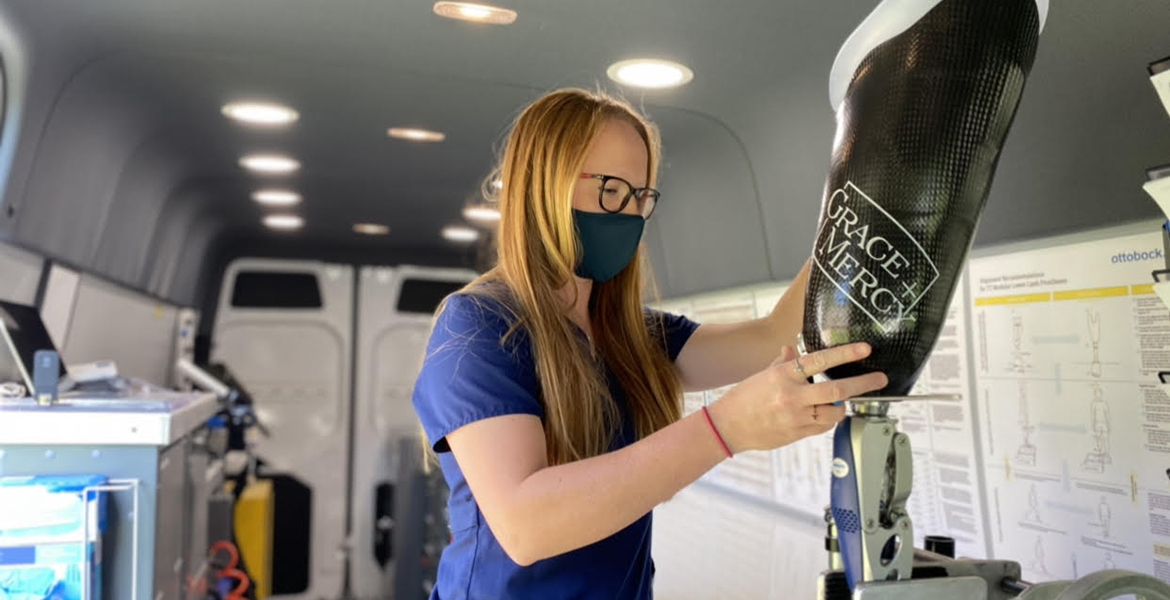
OSU medical students partner with OKC nonprofit Limbs for Life
Wednesday, December 16, 2020
Like everyone, the COVID-19 pandemic presented a challenge to Samuel Shepard, a second-year medical student at OSU College of Osteopathic Medicine and president of the OSU-COM chapter of the Student American Osteopathic Academy of Orthopedics.
“As medical students at OSU we are expected to partake in community outreach and various volunteer events. During a pandemic, group gatherings such as large volunteer operations have all but halted,” Shepard said. “So, with the challenge of finding outreach opportunities during this time of COVID-19 as a medical student I began to think outside the box for how to get involved with a project or organization that medical students could provide a service for.”
After some internet searches of local and state organizations and services, Shepard found Limbs for Life, a nonprofit based in Oklahoma City. Limbs for Life accepts donated prosthetics and refurbishes the piece or recycles parts and components of the piece and then shares them with clinic partners across the globe who assist their patients who cannot afford a prosthetic.
“As this organization mainly tries to recycle prosthetics, which they acquire through donations, I saw an opportunity to partner with OSU-CHS to help simply spread the word about this organization,” he said. “Limbs for Life would accept any financial donation, but they would possibly benefit more from a broader reach in terms of spreading their message.”
"As students who are well connected and can outreach through our various social media platforms, this is an opportunity to put those platforms to good use."
Shelly Dutton is development director at Limbs for Life and said she was thrilled when Shepard reached out to the organization.
“He had a well thought out plan and after some conversation, he dove right in to start,” Dutton said. “Much of a prosthesis is hardware— titanium rods, steel and metal connectors, the knee and feet, all of this can be recycled to assist others.”
According to the Amputee Coalition of America, 2.1 million Americans are living with limb loss, and on average 507 amputations take place in the U.S. each day.
Limbs for Life started 25 years ago to provide prosthetic care to amputees without other resources, and in 2019 more than 2,700 people received assistance with nearly 300 new limbs fabricated and more than 5,100 donated parts and components shared with patients through clinic partners, Dutton said.
“Hundreds of lives are being restored with quality prosthetic care. We are the safety net to provide care when there are no other options,” she said. “In Oklahoma and Texas, Medicaid doesn’t pay for prosthetic care. While we serve amputees across the U.S. and support international programs, 30 percent of clients are in Oklahoma and another 30 percent in Texas.”
Nonprofits like Limbs for Life have been affected by COVID-19, and while services have not been interrupted, general donations are slightly down and all special events and fundraisers were cancelled, so raising awareness is more important than ever.
“Nonprofits tend to fill the gaps in other public and private sector services. In the midst of a pandemic, many services are not fully operational and even more of the need gets moved to the nonprofit agencies,” Dutton said. “Keeping awareness of the need for prosthetic care and donations, both monetary and in used limbs, in front of the public is vital to maintaining our ability to serve amputees who come to us. Restoring mobility and independence to someone dealing with limb loss is not something that can wait for the pandemic to pass.”
Shepard said through this kind of service learning, not only is Limbs for Life benefitting from raised awareness, but students like himself see the benefits of becoming problem solvers and thinking about how to mitigate a burden for someone else.
“Services like Limbs for Life might one day be a resource for our patients. Beginning to familiarize yourself with nonprofit groups such as Limbs for Life might be the answer to a parent’s fears of how they will ever afford a prosthetic or to someone who thinks who would ever want an old, used prosthetic,” he said. “Now having seen the value in an organization like Limbs for Life we should begin forward thinking for other problems and understanding there are resources for almost every patient with a need. It is up to us to be vigilant and build relationships with various organizations to help address our patients’ needs.”
MEDIA CONTACT: Sara Plummer | Communications Coordinator | 918-561-1282 | sara.plummer@okstate.edu
